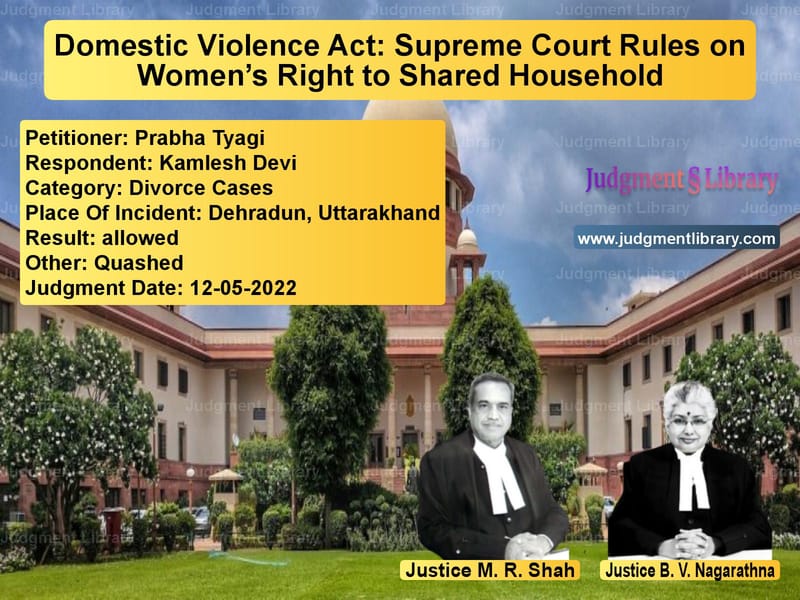Domestic Violence Act: Supreme Court Rules on Women’s Right to Shared Household
The Supreme Court of India recently delivered a crucial judgment in Prabha Tyagi v. Kamlesh Devi, interpreting key provisions of the Protection of Women from Domestic Violence Act, 2005 (D.V. Act). The case focused on whether a woman who no longer resides in her matrimonial home can claim protection under the Act and whether a domestic incident report is mandatory for initiating proceedings.
The case involved Prabha Tyagi, who was widowed soon after marriage and later subjected to alleged harassment by her in-laws. She sought relief under the D.V. Act, but her claim was rejected by the High Court of Uttarakhand. The Supreme Court overturned this ruling, reaffirming that the right to reside in a shared household extends even to women who no longer physically live there.
Background of the Case
The appellant, Prabha Tyagi, was married to Kuldeep Tyagi on June 18, 2005. Tragically, her husband passed away in a car accident on July 15, 2005, barely a month after their wedding. Following his death, she alleged that she was harassed and forced out of her matrimonial home by her in-laws. Pregnant at the time, she moved to Dehradun, Uttarakhand, to support herself and her daughter.
She filed a petition under Section 12 of the D.V. Act, seeking protection, residence, and compensation. She contended that her in-laws had denied her access to her Stridhana (property given to her at the time of marriage) and her late husband’s property. Additionally, she claimed that her mother-in-law had attempted to fraudulently claim insurance benefits after her husband’s death.
Respondent’s Defense
The respondent, Kamlesh Devi (mother-in-law), countered these claims, stating:
- Prabha Tyagi never lived in the shared household after marriage.
- Her claim of conceiving within 28 days of marriage was unnatural.
- Stridhana was never handed over to the respondent, and there was no proof of its possession.
- The marital home was never Prabha Tyagi’s permanent residence.
- She had fraudulently claimed to be the sole heir of her husband’s property in revenue records.
Lower Courts’ Rulings
Trial Court’s Decision
The Special Judicial Magistrate-I in Dehradun ruled in favor of the appellant, stating that:
- Her allegations of domestic violence were valid.
- The in-laws’ claim that her daughter was not Kuldeep Tyagi’s child was baseless.
- She had the right to reside in the shared household.
- She was entitled to Rs. 10,000 as compensation for mental harassment.
- Her Stridhana, except for a Maruti Alto car, was to be returned.
High Court’s Reversal
The respondent appealed, and the Uttarakhand High Court overturned the decision, ruling that:
- There was no evidence that Prabha Tyagi lived in the shared household.
- A Domestic Incident Report (DIR) from a Protection Officer was mandatory under Section 12 of the D.V. Act.
- Her allegations of domestic violence could not be established.
Supreme Court’s Ruling
The Supreme Court overturned the High Court’s ruling, reinstating the Trial Court’s order. The key findings were:
- A woman does not need to reside in the shared household at the time of seeking relief under the D.V. Act.
- Even if she has left the household due to domestic violence, she retains the right to claim protection.
- A Domestic Incident Report (DIR) is not mandatory for initiating proceedings under the D.V. Act.
- The right to residence is independent of ownership or legal title.
Key Judicial Observations
“The definition of ‘domestic relationship’ under Section 2(f) of the D.V. Act is broad and includes a relationship that has existed at any point in time.”
“A woman who has been denied her rightful place in the shared household due to domestic violence must not be left remediless.”
Impact of the Judgment
This ruling reinforces women’s rights under the D.V. Act and ensures that:
- Widows and estranged women are protected even if they no longer live in the shared household.
- Domestic violence victims can seek relief without procedural obstacles like a mandatory DIR.
- Women have an enforceable right to residence, preventing unlawful eviction.
Conclusion
The Supreme Court’s verdict in Prabha Tyagi v. Kamlesh Devi is a landmark ruling that upholds the dignity and rights of women facing domestic violence. By ensuring that procedural technicalities do not hinder justice, the judgment strengthens the protection afforded to women under Indian law. This decision sets a precedent for future cases, emphasizing that a woman’s right to safety and residence is paramount, regardless of whether she currently lives in the household or not.
Read also: https://judgmentlibrary.com/supreme-court-clarifies-limitation-period-in-domestic-violence-cases/
Petitioner Name: Prabha Tyagi.Respondent Name: Kamlesh Devi.Judgment By: Justice M. R. Shah, Justice B. V. Nagarathna.Place Of Incident: Dehradun, Uttarakhand.Judgment Date: 12-05-2022.
Don’t miss out on the full details! Download the complete judgment in PDF format below and gain valuable insights instantly!
Download Judgment: prabha-tyagi-vs-kamlesh-devi-supreme-court-of-india-judgment-dated-12-05-2022.pdf
Directly Download Judgment: Directly download this Judgment
See all petitions in Domestic Violence
See all petitions in Property Division in Divorce Cases
See all petitions in Alimony and Maintenance
See all petitions in Muslim Personal Law
See all petitions in Dowry Cases
See all petitions in Judgment by Mukeshkumar Rasikbhai Shah
See all petitions in Judgment by B.V. Nagarathna
See all petitions in allowed
See all petitions in Quashed
See all petitions in supreme court of India judgments May 2022
See all petitions in 2022 judgments
See all posts in Divorce Cases Category
See all allowed petitions in Divorce Cases Category
See all Dismissed petitions in Divorce Cases Category
See all partially allowed petitions in Divorce Cases Category







